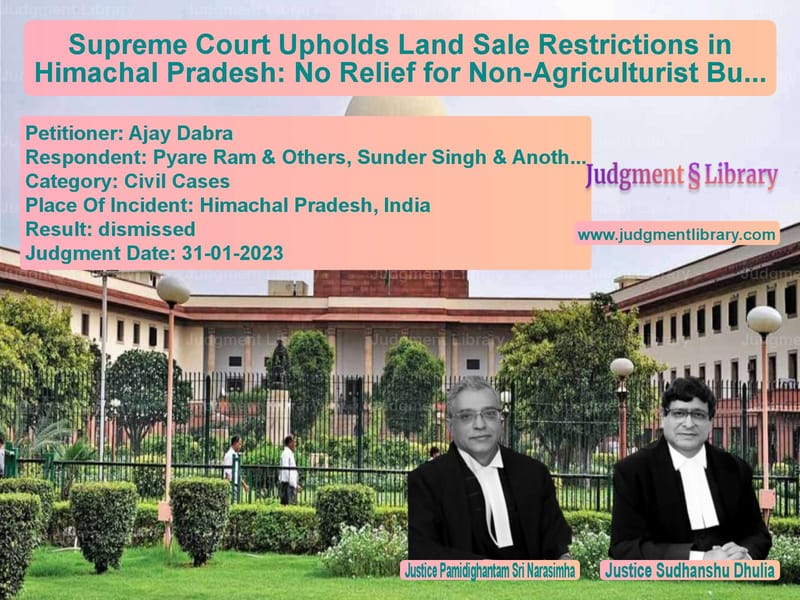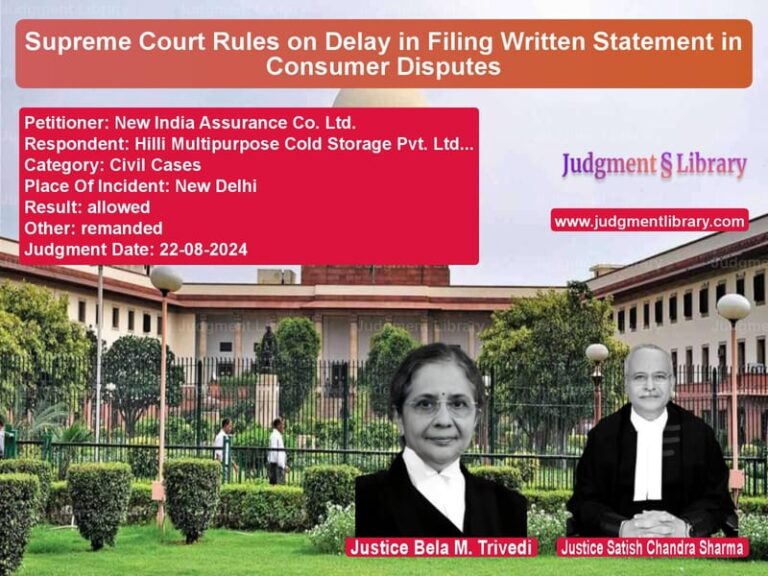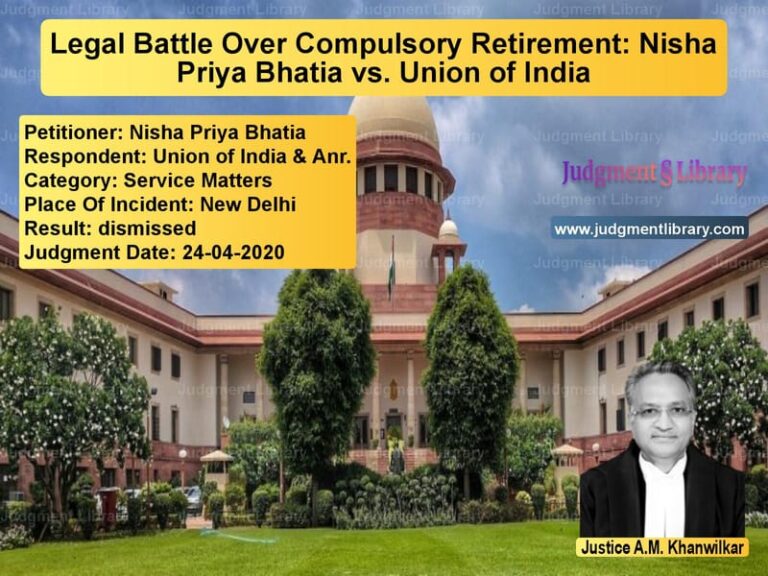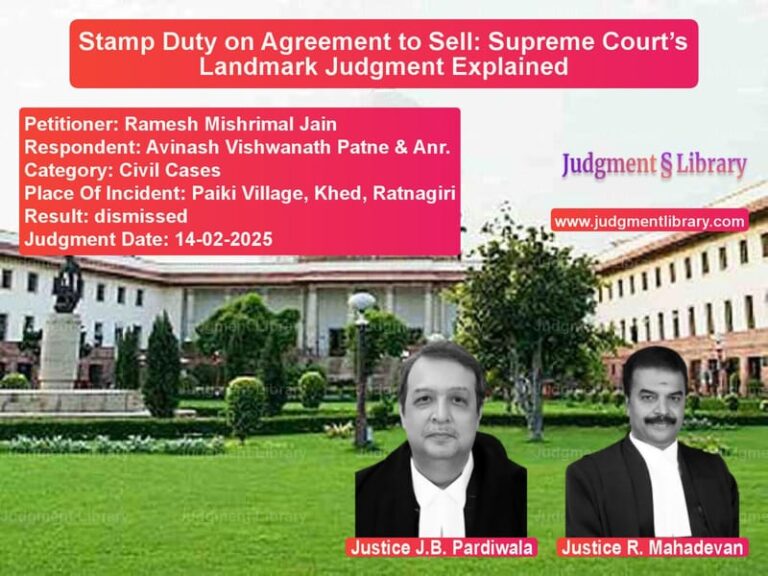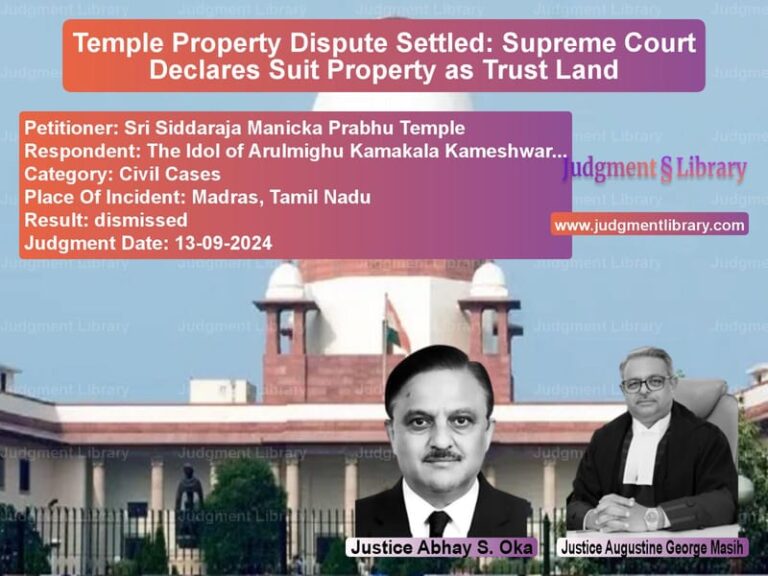Supreme Court Upholds Land Sale Restrictions in Himachal Pradesh: No Relief for Non-Agriculturist Buyers
The case of Ajay Dabra v. Pyare Ram & Others and Ajay Dabra v. Sunder Singh & Another revolves around a dispute over land sale agreements in Himachal Pradesh. The Supreme Court was called upon to decide whether a non-agriculturist could claim specific performance of a land sale agreement despite legal restrictions under the Himachal Pradesh Tenancy and Land Reforms Act, 1972. The judgment highlights the strict application of land laws intended to protect small landholders and preserve agricultural land.
Background of the Case
The case involves two appeals filed by Ajay Dabra, who sought specific performance of agreements to sell agricultural land in Himachal Pradesh. These agreements were originally executed between the landowners (defendants) and a private company, M/s Himalayan Ski Village Pvt. Ltd., which intended to purchase land for commercial purposes.
The issue arose when the company failed to obtain permission from the Himachal Pradesh government under Section 118 of the Himachal Pradesh Tenancy and Land Reforms Act, 1972, which restricts the sale of agricultural land to non-agriculturists. The company then assigned its rights under the agreement to Ajay Dabra, who subsequently filed a suit for specific performance.
The trial court dismissed the suit, holding that:
- The sale was conditional upon obtaining government permission, which was not granted.
- The assignment of rights to the plaintiff was not valid under the law.
On appeal, the Himachal Pradesh High Court dismissed Ajay Dabra’s appeal due to a 254-day delay in filing, rejecting his plea for condonation of delay. He then approached the Supreme Court.
Key Legal Issues
1. Delay in Filing Appeal
Ajay Dabra argued that his delay in filing the appeal should have been condoned as he lacked sufficient funds to pay the court fee. The High Court refused to condone the delay, stating that as a businessman and hotelier, the appellant had the financial means but failed to provide a valid reason for the delay.
2. Legality of the Land Sale Agreement
The primary legal issue was whether the land sale agreement could be enforced when government approval under Section 118 of the 1972 Act had not been obtained. The defendants contended that:
- Himachal Pradesh law does not permit the sale of agricultural land to non-agriculturists without prior approval.
- The agreement clearly required government permission, and the failure to obtain it made the contract unenforceable.
3. Validity of Assignment of Rights
The plaintiff (Ajay Dabra) argued that he, being an agriculturist, could legally acquire the land, and the original contract’s assignment to him was valid. The defendants countered that the agreement did not provide for unilateral assignment and that the seller’s consent was not obtained.
Supreme Court’s Judgment
1. Dismissal of Delay Condonation Plea
The Supreme Court upheld the High Court’s rejection of the delay condonation application, observing:
“The appellant was an affluent businessman and hotelier. Insufficient funds cannot be a sufficient reason for condonation of delay, particularly when the law permits the filing of a defective appeal with deficient court fees.”
The Court cited Section 149 of the Code of Civil Procedure (CPC), which allows litigants to file an appeal with a deficiency in court fees and rectify it later. Since the appellant failed to utilize this provision, his plea lacked merit.
2. Invalidity of the Land Sale Agreement
The Supreme Court ruled that the agreement was unenforceable because:
- Section 118 of the Himachal Pradesh Tenancy and Land Reforms Act, 1972, prohibits land transfer to non-agriculturists without prior government approval.
- The agreement itself stipulated that the transaction was contingent on obtaining such approval, which was denied.
3. Illegal Assignment of Rights
The Court held that the assignment of contractual rights from the original purchaser to the plaintiff was invalid because:
- The agreement did not contain a clause allowing assignment without the seller’s consent.
- The original purchaser (Himalayan Ski Village Pvt. Ltd.) was a company ineligible to buy land under Himachal Pradesh law, and its inability to perform the contract meant that assignment of rights was ineffective.
Important Observations by the Court
The Supreme Court emphasized that the intent behind Section 118 of the 1972 Act is to protect agricultural land and prevent its conversion for non-agricultural purposes. The Court stated:
“The whole purpose of Section 118 is to protect agriculturists with small holdings. By merely assigning rights to an agriculturist who intends to use the land for a purpose other than agriculture, the law would be defeated.”
The Court also referred to the Himachal Pradesh High Court’s decision in Ashok Madan v. State of H.P., which held:
“The law restricts the transfer of land to non-agriculturists to prevent economically stronger individuals from taking undue advantage of small landowners.”
Final Decision
The Supreme Court dismissed the appeals, ruling that:
- The delay in filing the appeal was unjustified.
- The agreement was unenforceable due to non-compliance with Section 118.
- The assignment of rights was invalid.
Impact of the Judgment
The ruling reinforces the strict interpretation of land sale laws in Himachal Pradesh, ensuring that agricultural land remains protected from commercial exploitation. Key takeaways from the judgment include:
Read also: https://judgmentlibrary.com/supreme-court-rules-on-land-acquisition-dda-vs-shakuntla-devi-case/
- Strict Adherence to Land Laws: The decision underscores that permission under Section 118 is a mandatory prerequisite for land sales to non-agriculturists.
- Validity of Agreements: Contracts that require government approval remain unenforceable if such approval is not obtained.
- Timeliness in Appeals: The judgment reiterates that courts will not condone delays unless a strong and justifiable reason is provided.
Conclusion
The Supreme Court’s decision in this case serves as a precedent for ensuring compliance with land transfer regulations in Himachal Pradesh. It affirms the legislative intent behind the Himachal Pradesh Tenancy and Land Reforms Act, 1972 and safeguards the interests of small landowners. For future land transactions, it is imperative that buyers and sellers understand the legal requirements and seek necessary permissions to avoid unenforceable agreements.
Petitioner Name: Ajay Dabra.Respondent Name: Pyare Ram & Others, Sunder Singh & Another.Judgment By: Justice Pamidighantam Sri Narasimha, Justice Sudhanshu Dhulia.Place Of Incident: Himachal Pradesh, India.Judgment Date: 31-01-2023.
Don’t miss out on the full details! Download the complete judgment in PDF format below and gain valuable insights instantly!
Download Judgment: ajay-dabra-vs-pyare-ram-&-others,-supreme-court-of-india-judgment-dated-31-01-2023.pdf
Directly Download Judgment: Directly download this Judgment
See all petitions in Property Disputes
See all petitions in Specific Performance
See all petitions in Contract Disputes
See all petitions in Landlord-Tenant Disputes
See all petitions in Judgment by P.S. Narasimha
See all petitions in Judgment by Sudhanshu Dhulia
See all petitions in dismissed
See all petitions in supreme court of India judgments January 2023
See all petitions in 2023 judgments
See all posts in Civil Cases Category
See all allowed petitions in Civil Cases Category
See all Dismissed petitions in Civil Cases Category
See all partially allowed petitions in Civil Cases Category

